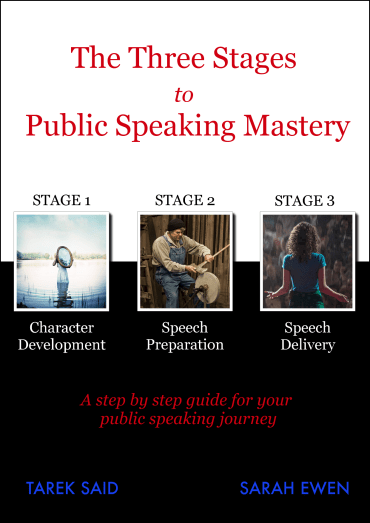TICK TOCK – TIME MANAGEMENT IN PUBLIC SPEAKING!
Time management is critical in every area of life. We all know it in theory, yet in practice time can be challenging to manage effectively.
The same is true in public speaking. In fact time management is magnified in public speaking.
Unlike your personal life where it may only be you watching the clock, when you are public speaking you have an audience also watching the clock for you.
Time pressure on stage is therefore most certainly on!
Different speakers react to time on stage in different ways.
1. The racers: too fast
At one extreme are the speakers who make it their mission to get on-stage and off-stage faster than the speed of light.
These are the speakers who are feeling, thinking and often literally saying “I just want to get this over and done with as quickly as possible” and they literally mean it.
Key indicators you may be racing ahead of the clock is when:
- you start speaking on your way to the stage reducing time on stage and some, if not all the audience miss out on the introduction
- you get on stage like a loaded gun and disseminates the information as if it is a pre-recorded speech being played back at double the normal speed. The pace of speech is way too fast and pauses are a luxury neither you or the audience get to indulge in
-
- you use your notes and/or Powerpoint slides as a shield to protect yourself from the prying eyes of the audience often reading word for word from your notes in the hope it makes your time on stage less painful. Sadly what ends up happening is the opposite. It makes your time on stage worse than a trip to the dentist for root canal for the audience when you do that.
2. The Lingerers: too slow
At the opposite extreme are speakers who love the stage just a little too much. Either that or the speaker has prepared too much material and has not practiced it.
The ultimate goal in this case for the speaker is to share every last word of the speech they have prepared regardless of the time available.
As an audience member this experience can be likened to over indulging at dinner, stating how full you are and the dinner host still insisting on dishing you up a dessert which tips you over the edge.
It is quite simply too much and disrespectful!
What does running out of time say about you as a speaker?
- It suggests you may be unaware of not only the time itself but the audience’s receptivity. Body language of audience members is a warning sign that time is quite literally up and it is not advised to keep talking!
- It can be an indicator that you have not practiced as you have way too much material and have simply failed to time it. Or even worse, you have done little to no preparation and are taking a very long time to get to the point.
-
- It may be a red flag that the speech is structurally flawed. If a speech has a tight structure the key message can be delivered in less than a minute or delivered by elaborating over the course of several hours. If there is a tight structure it can be flexed according to the time available. If the structure is weak the speaker does not have the option to condense and summarise the key message and supporting points. This is because quite often the speaker themselves does not know what the key message is and therefore must deliver the speech in its entirety regardless of time available.
3. The pacers: just right
Between these two extremes is the sweet spot where the speaker is cool, calm, in control and working with the clock.
Working with the clock as opposed to racing ahead of it or lagging behind.
As a speaker you should always aim to manage your time effectively and where a time allocation has been given, you must respect this and work within the time constraint given.
Below are five practical ways you can successfully manage your time on stage – every time:
- Know the time. Sounds simple but so many speakers get on stage and don’t have a mechanism for knowing the actual time. There is no clock visible. The simplest and best way to overcome this is to wear a watch and then you can never be caught out. Using your phone is also an option but can be more clumsy than a watch and more distracting. Knowing the time gives you the best chance possible of running on time!
- Have practice time. A key element of preparing and practicing a speech properly prior to delivery is to time it. Some speakers don’t practice at all whilst some other speakers practice and still don’t time it. To be able to manage time effectively in delivering you must time the speech during practice time.
- Develop a healthy mindset. If you want to avoid the extremes highlighted above, having a healthy mindset towards every public speaking experience will help significantly in achieve effective time management. Before stepping into the spotlight be determined to enjoy every moment, have a plan in place to track time during delivery, and decide ahead of time to respect your audience’s time by staying on time!
- Never make reference to the time! Phrases like “I am running out of time”, “I don’t have enough time”, “I would have told you about that if we had more time”, “I never got a chance to get to the gold” or even “We are good and still have time” should never be uttered to your audience. If you are truly managing your time, no attention should be drawn to it during your speech.
- Let the audience enjoy their time. Effective time management is not about packing in as much content as possible and knowledge dumping. It is about being able to use the time well to let your audience have a valuable and memorable experience. A speaker that builds in time to pause, gives the audience time to react (e.g. laugh) and spends time building rapport and engaging the audience is the most effective at time management on stage.
Effective time management is essential in public speaking. As a speaker you want to be working with the clock at all times. By applying the practical tips provided you can avoid racing ahead of the clock or be lagging behind it. For more helpful tips refer to our free ebook that you can download buy filling the form below.
Time management is critical in every area of life. We all know it in theory, yet in practice time can be challenging to manage effectively. The same is true in public speaking. In fact time management is magnified in public speaking. Unlike your personal life where it may only be you watching the clock, when you are public speaking you have an audience also watching the clock for you.
Time pressure on stage is therefore most certainly on!
Different speakers react to time on stage in different ways.


